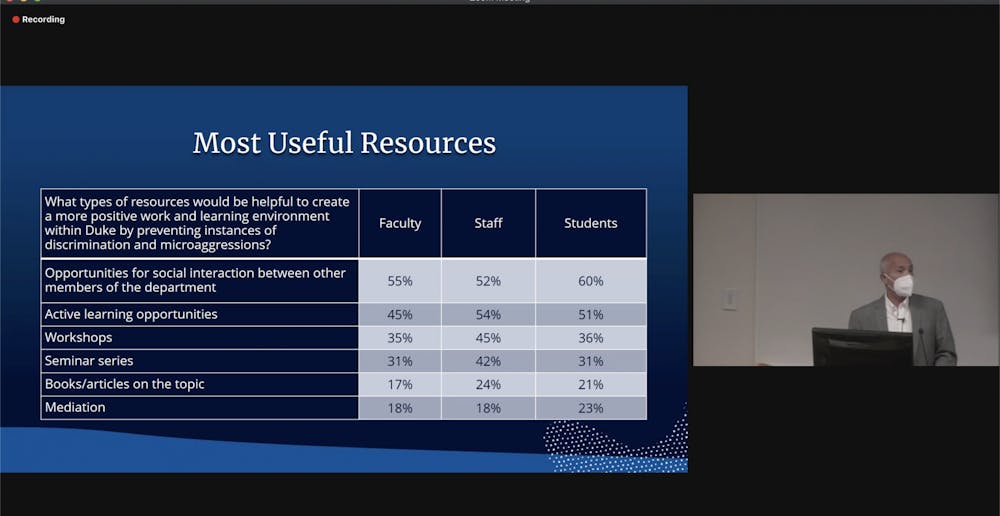Members of Duke’s Academic Council heard a presentation on the results of the 2021 campus climate survey at their meeting last Thursday.
The survey was distributed in the spring to all Duke students, faculty and staff, making this the first time a campus-wide survey has gone out to Duke staff.
The data were broken down into four racial categories: Black, white, Hispanic and Asian. Kimberly Hewitt, vice president for institutional equity and chief diversity officer—who led the first half of the presentation—said that in the future, Duke would like to have disaggregated data by race, as well as include more options for gender; the survey only allowed participants to mark themselves as a man or a woman.
“Generally, we saw unevenness; in particular, communities of color reported lower degrees of satisfaction with different aspects of the survey questions, and likewise, we saw those kinds of differences between men and women,” Hewitt said.
Fifty-three percent of staff members filled out the survey, as well as 40% of faculty and 24% of students, according to Hewitt. She thought that the time of year that the survey was sent out was a barrier to students filling it out, also noting that faculty and staff are surveyed more often.
Satisfaction with the University
Less than 50% of Black students, faculty and staff said that they were “satisfied” or “very satisfied” with the racial and ethnic diversity of their unit, department and/or program leadership. This was the lowest satisfaction rate among all four races surveyed; the highest rate of satisfaction was among Asian staff members.
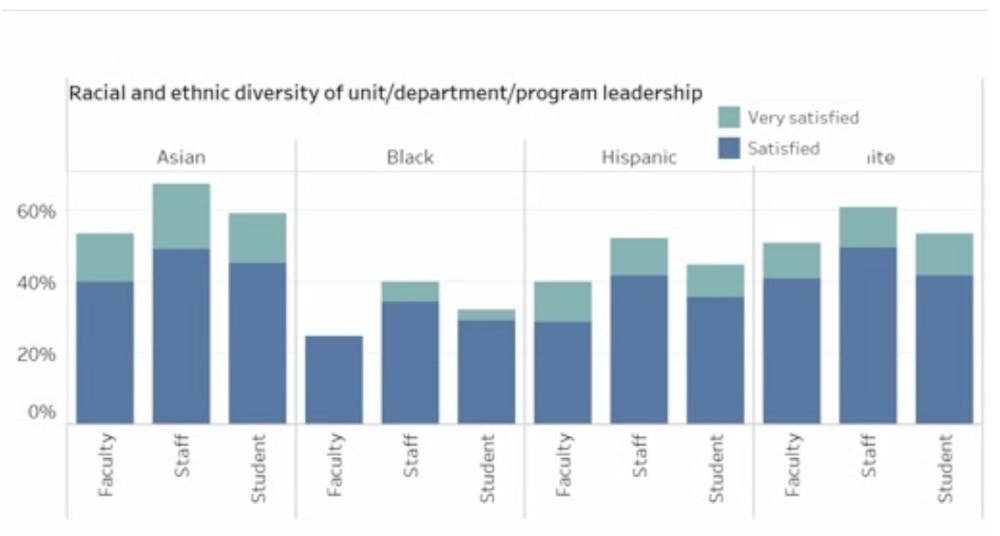
Similarly, less than 50% Black students, faculty and staff said they were satisfied or very satisfied with the racial and ethnic diversity of the faculty. Asian members of the community again had the highest satisfaction rates.

Compared to men, a fewer percentage of women said they were “satisfied” or “very satisfied” with Duke’s commitment to promoting women.

Hewitt echoed her hopes to have cross-sections of identities surveyed in the future; “for example, what are the experiences of women of color?” she explained.
When posed with the statement “I feel that the climate for underrepresented minorities is at least as good as that for members of majority groups,” members of the Black and Hispanic communities were less likely to say they “agree” or “strongly agree” compared to Asian and white survey respondents.

Hewitt noted that they similarly saw less satisfaction among members of the LGBTQ+ community.
When asked if they feel that the climate for women was “at least as good as that for men,” a lower percentage of women said they “agreed” or “strongly agreed” compared to male respondents.
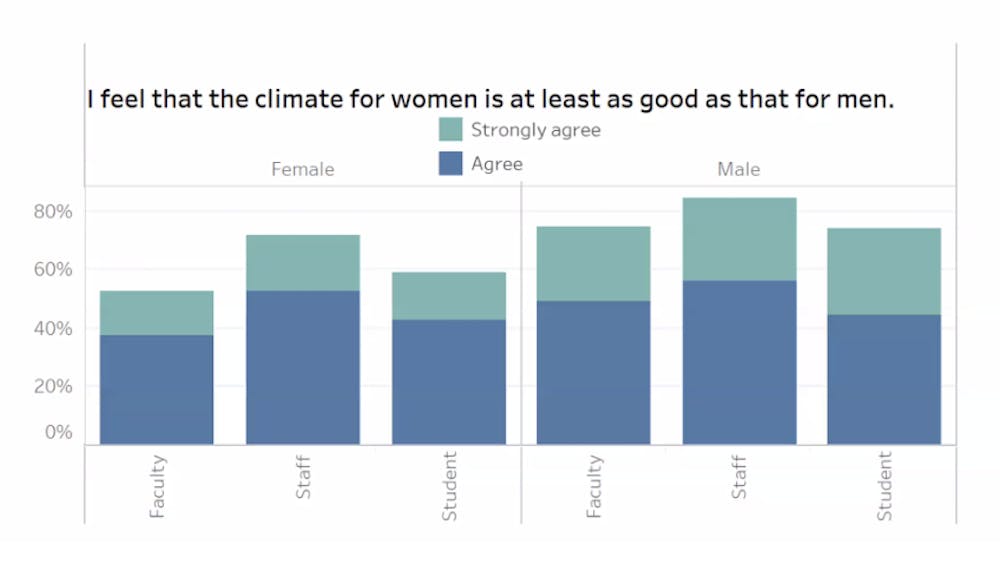
Perceptions of equity in units
Abbas Benmamoun, vice provost for faculty advancement, led the next portion of the presentation.
Black members of the community were less likely to say they “agree” and “strongly agree” with the statement “I feel comfortable expressing my views without fear of negative consequences.”
“This is related to whether or not people feel like they belong and they can trust each other,” Benmamoun said.
Benmamoun noted that Duke needed to discuss how it can remain “a place for vigorous debates because that’s how we can advance and how we can foster an interest in our community and our students,” he said.
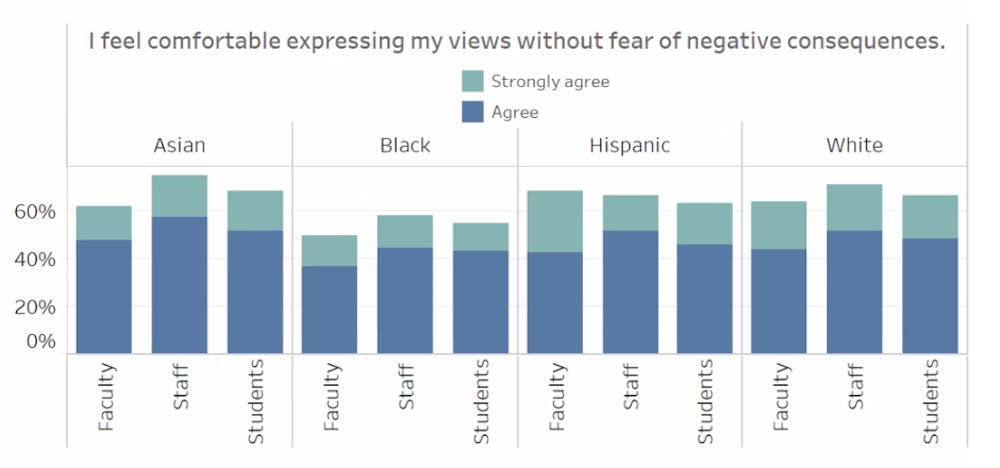
Again, Black members of the community were less likely to “agree” or “strongly agree” with the statement “I feel the criteria for advancement/promotion are clearly communicated." Across all races, faculty were more likely to agree with the statement than staff, particularly among the Hispanic and white respondents.
“We hear complaints, and that is reflected in the survey as well, that there is a lack of clarity about guidelines that already exist, but also there is some lack in some places in opportunities for advancement. We see this from staff and from faculty as well,” Benmamoun said, noting it was a priority to make sure the policies in place are clear and accessible to people.

More Black and Asian respondents indicated that they feel underpaid for their work. Staff members were more likely to say they felt underpaid than faculty members across all racial groups.
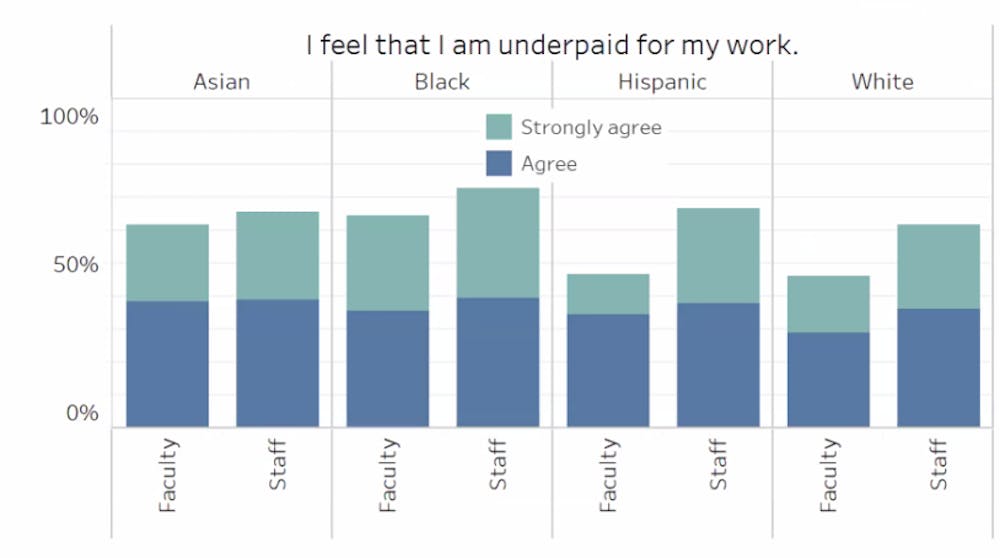
Interpersonal experiences
More female respondents indicated that they had experienced microaggressions in the last year than men—representing “something for us to be concerned about,” Benmamoun said.
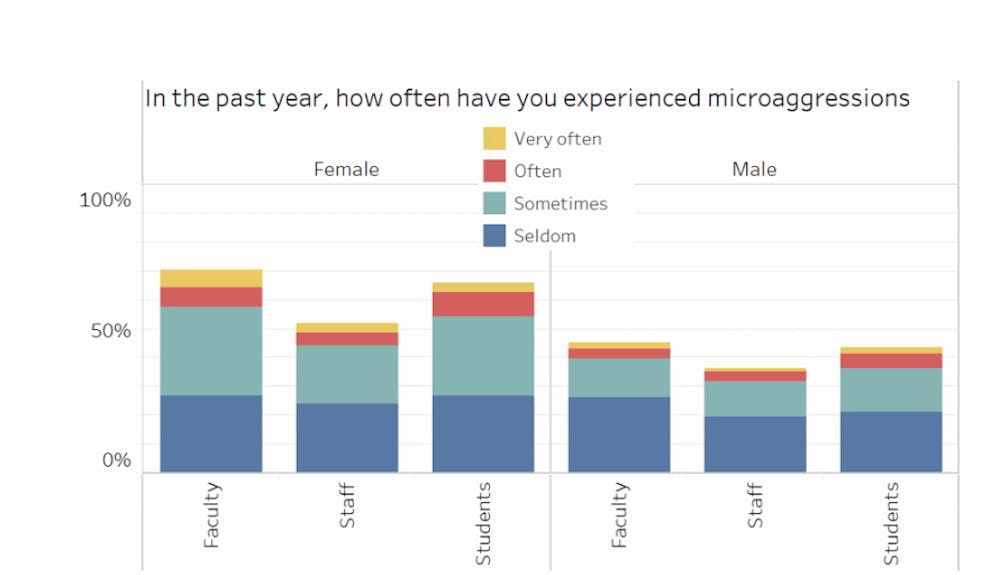
Benmamoun again noted “alarming” data when broken down by race, with about 90% of Black respondents saying they had “seldom, sometimes, often" or "very often" experienced microaggressions in the last year. Black faculty had the highest percentage of respondents who indicated they “very often” experienced microaggressions.
“This is an issue of climate, culture and how we treat each other,” Benmamoun said, “so we need to make sure that we address this and are intentional about this.”
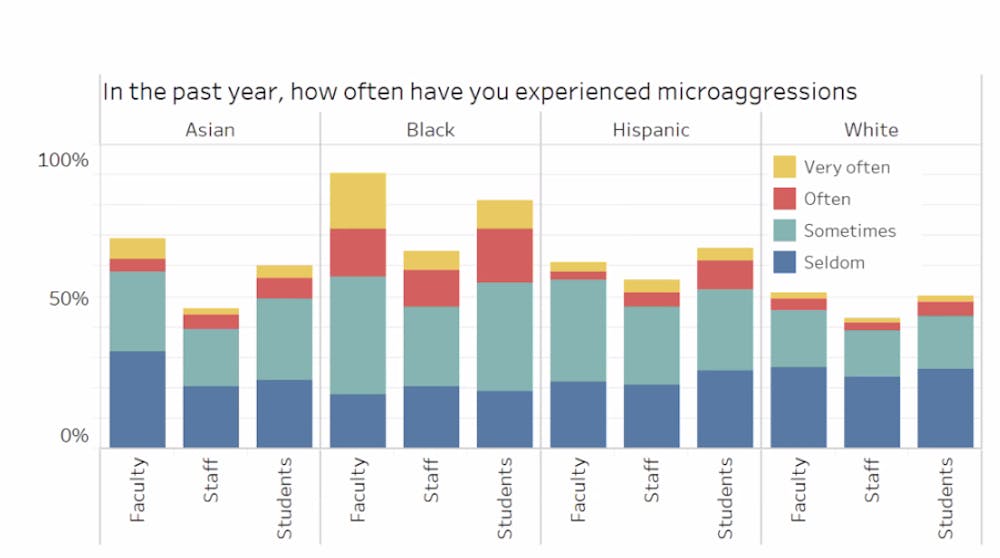
“I think this is really not just a question of employing more resources, though that probably needs to be done, or training leaders, though that also needs to be done, but it’s really on us as individual members of this community o make sure that we treat everybody with respect and that they are full-fledged members of this community,” Benmamoun said.
About 60% of Black students said they “agreed” or “strongly agreed” that “discrimination and/or microaggressions have impacted [their] productivity or interactions at work or study.”
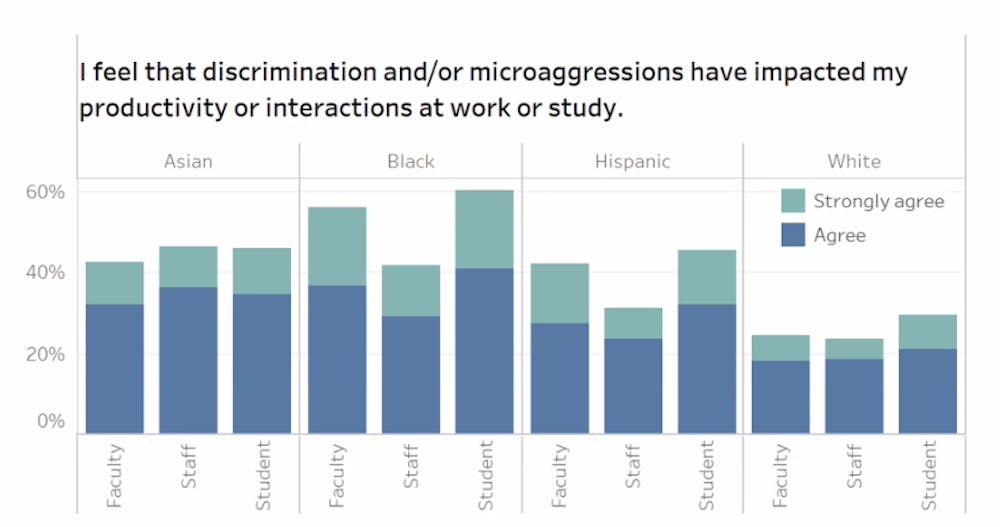
Benmamoun said that Duke is making progress on hiring and Duke did a “decent job” over the last year, particularly in terms of Black people, but that “we cannot hold onto people if they don’t feel valued here.”
“This is a place for them to flourish and thrive, and they should make this their community. This is again a time for us to think about this and be more intentional,” Benmamoun said.
Most respondents feel that the microaggression or discrimination they experienced was on the basis of sex, followed by racial or ethnic identity and then age. Benmamoun reiterated Hewitt’s sentiment that in the future, it will be important to better include more gender options on the survey and better desegregate data across different categories, such as race and gender.
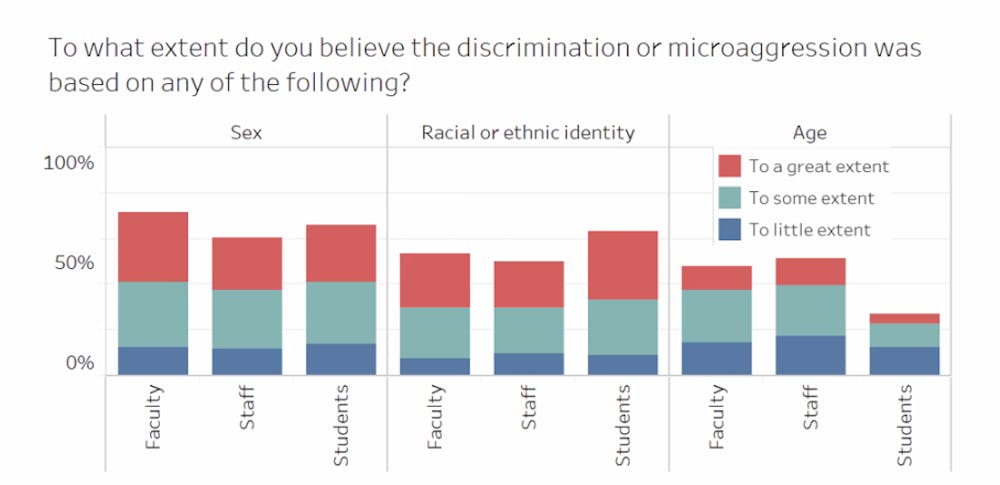
Racial Equity Advisory Council
Duke formed a Racial Equity Advisory Council to take the recommendations that come from four subcommittees and “[identify] strategies to make them feasible,” according to Hewitt. The presentation noted the four goals of the committee were to advise executive leadership; create a structure for the accountability of Duke’s response; maintain momentum; and measure progress.
The Climate and Assessment subcommittee will identify opportunities for additional data collection and address nuances and gaps in data. The Education Curriculum and Training will help develop efforts to “bolster ongoing educational engagements focused on racial equity,” as well as explore ways to make Duke’s curricula “equitable and inclusive of diverse voices and perspectives.”
The Communications subcommittee will “develop a strategy for broad communications and micro-messaging,” as well as “identify and address key audiences” for REAC communication; lastly, the Infrastructure and Policy subcommittee will examine and examine the goals the other subcommittees create and specify policy and resource needs to implement their recommendations. The subcommittee will produce a report at the end of the academic year that outlines policy development and what resources are needed for each of Duke’s racial equity goals.
In other business
Leigh Goller, chief audit, risk and compliance officer, walked members through updates to Duke’s Values in Action website, which aims to “concisely express the purpose, direction, drivers and character of our institution” and curate Duke’s codes of conduct and values in an accessible manner.
The new website will contain Duke’s diversity, equity and inclusion policies; human resources policies, such as open expression and business practices; information about protecting information and confidentiality; and a place for members of the community to ask questions and share concerns.
“Having such a website should make it easier for all of us to find the policies and principles that shape Duke’s culture and interactions amongst us, while aligning with Duke’s values of excellence, trust, inclusion, respect and discovery,” said Council Chair Erika Weinthal, professor of environmental policy and public policy.
Duke’s previous code of conduct was written 20 years ago, Goller said, and focused on rules and regulations with a “very heavy compliance attitude and stance.” Since then, Goller emphasized how culture has become much more important in how Duke thinks about its behaviors and responsibilities; the website was a combination of refocusing Duke’s priorities and better curating a set of resources to help uphold Duke’s standards.
The Council’s Dec. 2 meeting is canceled.
Get The Chronicle straight to your inbox
Signup for our weekly newsletter. Cancel at any time.

Leah Boyd is a Pratt senior and a social chair of The Chronicle's 118th volume. She was previously editor-in-chief for Volume 117.

